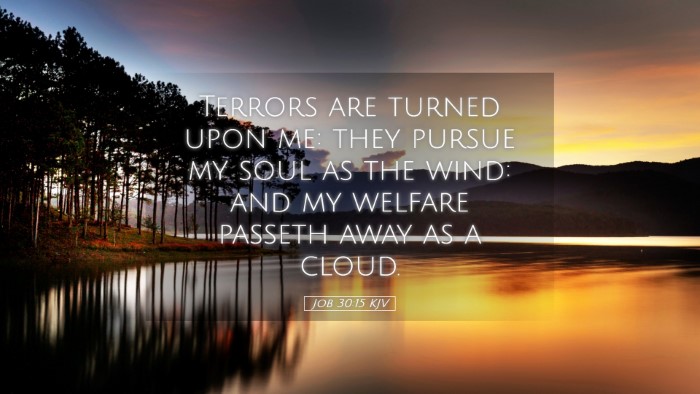Commentary on Job 30:15
Introduction
The Book of Job presents profound themes of suffering, righteousness, and divine justice. Job 30:15 encapsulates the climactic turn in Job's lamentation, reflecting his deep anguish and feelings of abandonment. In this commentary, we draw upon the insights from esteemed public domain theologians such as Matthew Henry, Albert Barnes, and Adam Clarke to explore the theological, historical, and literary significance of this verse.
Job 30:15 - Text and Context
Verse: "Terrors are turned upon me; they pursue my soul as the wind: and my welfare passeth away as a cloud." (Job 30:15, KJV)
This verse occurs within Job's discourse on his deteriorating condition. It comes as part of a larger lament where Job recounts the transition from his former state of prosperity to his current state of misery. Here, he articulates a sense of being pursued and attacked, akin to a prey by fierce hunters.
Literary Structure and Analysis
Understanding the Imagery:
Henry emphasizes that the language Job employs conveys desperation. The imagery of 'terrors' evokes the idea of supernatural fears or existential dread. Such terror seems not simply internal but originated from divine sources (Job 30:20). In embracing this imagery, Job suggests an affliction that surpasses emotional turmoil—entering the realm of cosmic injustice where he feels hunted and tormented.
Theological Implications
Divine Justice and Human Suffering:
Barnes provides crucial context on the theological underpinnings of Job's plight. Job's assertion about terrors reveals an inherent struggle with the concept of divine justice. The stark juxtaposition of Job's former integrity against his present suffering raises profound questions about the nature of God and the rationale for suffering. Barnes highlights this existential struggle, showcasing that believers, like Job, often grapple with a theology that does not neatly correlate sin with suffering.
Historical Context
Clarke contextualizes this verse against the backdrop of ancient Near Eastern literature, where the motif of suffering and divine silence are pervasive. Job's friends attempted to interpret his suffering through a lens of retributive justice, yet this framework collapses under the weight of Job's lived experience. The historical considerations become vital as we decipher Job's sentiments—his condition not merely as personal but reflective of a broader human experience.
Application for Faith Communities
Understanding Suffering Today:
The insights from these commentaries provide valuable applications for modern faith communities. In observing the journey of Job, believers are encouraged to engage with suffering honestly. The raw expressiveness of Job’s language can serve as a model for cathartic prayer and lament.
- Lamentation as Prayer: Pastors are urged to incorporate lamentation into congregational prayer, drawing upon Job's example to express not only anguish but also the quest for understanding and restoration.
- Community Support: The commentary by Clarke suggests that recognizing the communal nature of suffering can alleviate feelings of isolation. Church leaders may foster environments that provide space for individuals to share their challenges.
Conclusion
Job 30:15 encapsulates a critical moment in the text—where despair brings forth an unmistakable cry for acknowledgment from a silent God. Through the insights of Henry, Barnes, and Clarke, we gather a holistic understanding of this verse's complexity, its theological ramifications, and its implications for contemporary believers. In navigating suffering, let us remember Job's example: to express our deepest fears and anguish while still seeking the profound presence of God amidst the storm.


